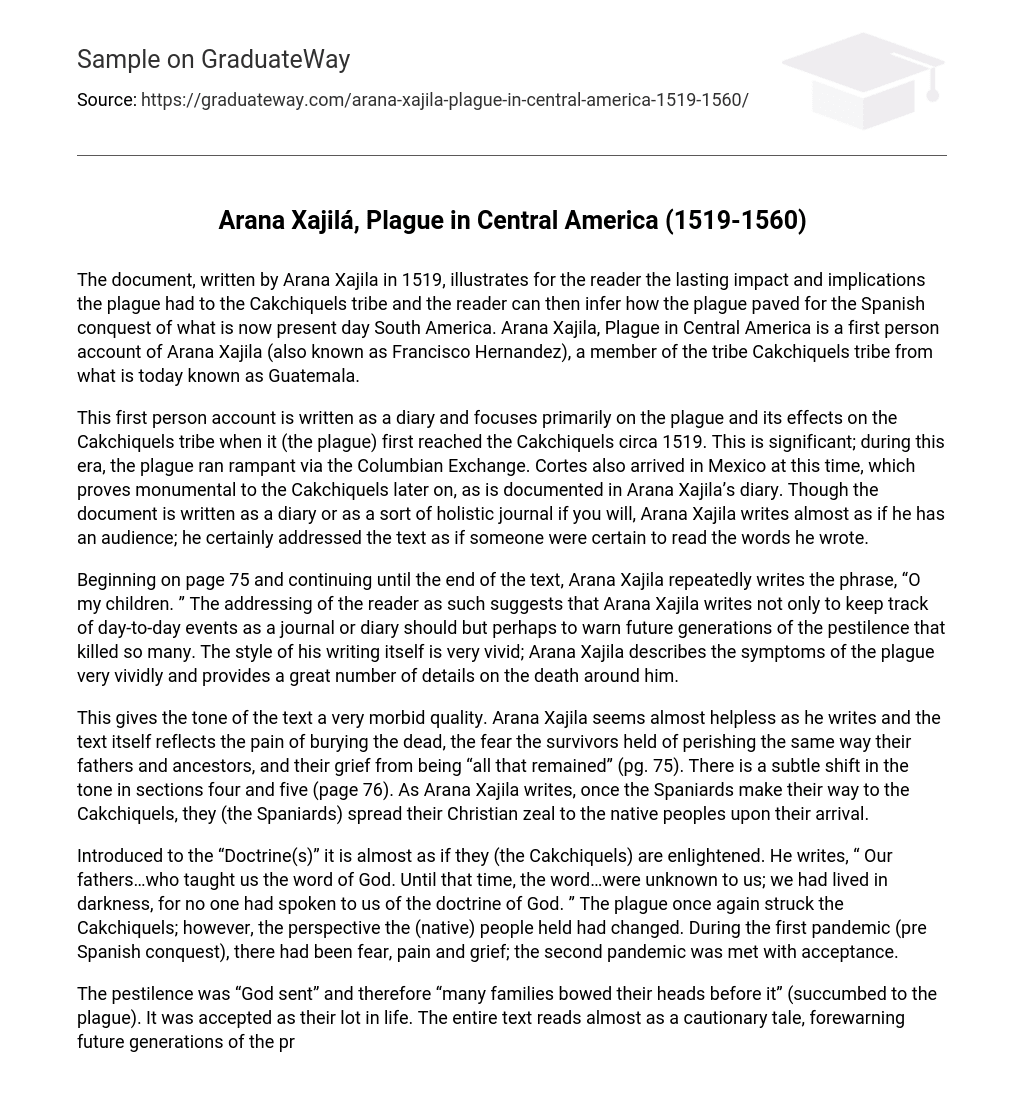The document, written by Arana Xajila in 1519, illustrates for the reader the lasting impact and implications the plague had to the Cakchiquels tribe and the reader can then infer how the plague paved for the Spanish conquest of what is now present day South America. Arana Xajila, Plague in Central America is a first person account of Arana Xajila (also known as Francisco Hernandez), a member of the tribe Cakchiquels tribe from what is today known as Guatemala.
This first person account is written as a diary and focuses primarily on the plague and its effects on the Cakchiquels tribe when it (the plague) first reached the Cakchiquels circa 1519. This is significant; during this era, the plague ran rampant via the Columbian Exchange. Cortes also arrived in Mexico at this time, which proves monumental to the Cakchiquels later on, as is documented in Arana Xajila’s diary. Though the document is written as a diary or as a sort of holistic journal if you will, Arana Xajila writes almost as if he has an audience; he certainly addressed the text as if someone were certain to read the words he wrote.
Beginning on page 75 and continuing until the end of the text, Arana Xajila repeatedly writes the phrase, “O my children. ” The addressing of the reader as such suggests that Arana Xajila writes not only to keep track of day-to-day events as a journal or diary should but perhaps to warn future generations of the pestilence that killed so many. The style of his writing itself is very vivid; Arana Xajila describes the symptoms of the plague very vividly and provides a great number of details on the death around him.
This gives the tone of the text a very morbid quality. Arana Xajila seems almost helpless as he writes and the text itself reflects the pain of burying the dead, the fear the survivors held of perishing the same way their fathers and ancestors, and their grief from being “all that remained” (pg. 75). There is a subtle shift in the tone in sections four and five (page 76). As Arana Xajila writes, once the Spaniards make their way to the Cakchiquels, they (the Spaniards) spread their Christian zeal to the native peoples upon their arrival.
Introduced to the “Doctrine(s)” it is almost as if they (the Cakchiquels) are enlightened. He writes, “ Our fathers…who taught us the word of God. Until that time, the word…were unknown to us; we had lived in darkness, for no one had spoken to us of the doctrine of God. ” The plague once again struck the Cakchiquels; however, the perspective the (native) people held had changed. During the first pandemic (pre Spanish conquest), there had been fear, pain and grief; the second pandemic was met with acceptance.
The pestilence was “God sent” and therefore “many families bowed their heads before it” (succumbed to the plague). It was accepted as their lot in life. The entire text reads almost as a cautionary tale, forewarning future generations of the previous and current generations’ mistakes, citing those same mistakes as the reason why God sent the pestilence down upon them. In the macro-historical context, even just this one document gleans much insight into the people and their thoughts during the early to mid fourteenth century.
The Spanish conquest is proved to be successful in part as their (the Spaniards) Christian zeal was being taught to the indigenous people of the lands who seemingly accepted the religion and doctrine fairly quickly. This “enlightenment” of the Cakchiquels proves to be significant as it entirely changes their perspective on the coming of the plague. The plague itself is a result of the Columbian Exchange. Though monumental to society and trading at the time, the contact between cultures made it easier for disease to spread.
The spreading of the disease also brings the reader back to the Spanish conquest – conquest is no easy feat, but it was an easier conquest as the indigenous peoples had already once been ravaged by the plague. Too weak to fight the incoming Spaniards, the Spaniards were able to assume control over the Cakchiquels fairly quickly and then free to spread their own Christian zeal amongst the savage and uncivilized peoples. The impact the Spaniards made through their conquest of present day South America is evident even to this day as Spanish is the most widely spoken language in those areas, as Christianity is the main religion.





